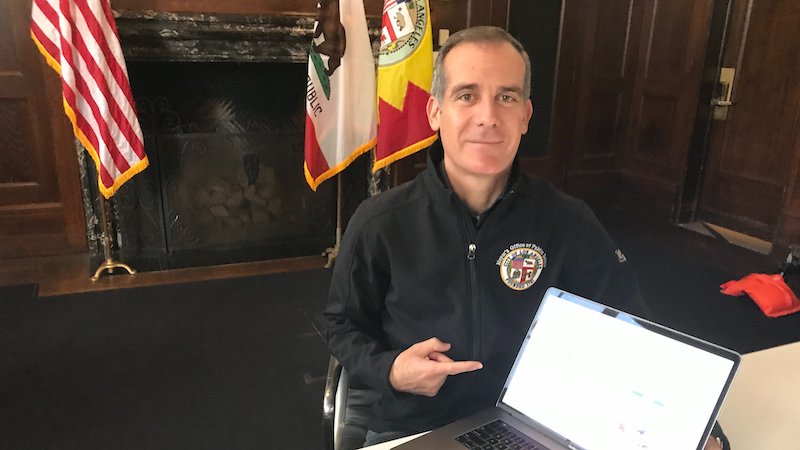
In addition to his daily evening briefing, Mayor Eric Garcetti hosted an AMA on the /r/LosAngeles subreddit earlier today to answer our questions about the coronavirus pandemic.
If you’d like to see the whole thing, click here. Don’t feel like scrolling? Here are some of the key highlights we found (lightly edited for brevity/clarity):
When asked how long we’ll have to be ‘Safer at Home,’ Garcetti says probably two months minimum, but possibly longer (like in Wuhan, where they did three months):
In 1918, San Francisco declared victory early and had a second, very deadly recurrence of influenza deaths, so I will take the advice of doctors and public health professionals.
And, in response to that same question, we won’t get everything back at once:
I led a call of 50+ mayors from around the world on Zoom about a week ago and the mayor of Milan, my good friend, Giuseppe Sala, said that they will return some stronger, younger people (including those who might have already had COVID-19) return to work and be lifted from their order, while others who are older and/or more vulnerable will have to wait longer. I could see that being the advice given here too.
So, wait. What about a second wave? Garcetti says we should expect one, but L.A. can prepare:
This means in the summer, getting our hospitals in shape for a second wave; preparing a reserve of tests; looking at antibody testing to keep some more people working instead of staying at home; having the economic assistance at the national level to keep businesses going and paying their employees; assistance for self-employed, under and unemployed, and immigrants, and having better/quicker/more extensive tools to chase down those that are positive and immediately quarantine them and their contacts.
Garcetti notes the latter would have to address privacy concerns and involve the work of more than just a single city.
Is there a ‘tipping point’ that would allow us to resume our normal lives? No, and again, the return to normalcy will be slow.
As for opening things up, my instinct is to go slow or to go smart. Slow given that many places that declare victory early get slammed with a second short-term wave. Smart meaning that there are approaches that might allow us to have “immunity passports” or some evidence through antibody tests that we are good to go to work and stay at work, though we’d want to be sure that folks can’t spread it even if they’ve had it. Certainly, when we get to zero deaths (which come later than the cases), we should be at a place where we are able to come out of this situation. My gut is that we will do it before zero deaths (since many people will continue to hang on for a long time before succumbing), but we are a way off (months, not weeks) from that kind of a statistic.
Will the City consider shutting down roadways so that pedestrians can use them to exercise? The Mayor said they’ll keep thinking about it, but:
Even though people can try to do that as safely as possible, public health recommends that neighborhoods stay put so that we don’t have more and more spread.
Will the Port-a-Potties installed on Skid Row stay after the pandemic? Yes, and more resources are coming down the pipeline:
We doubled the storage for Skid Row residents recently, allowing 1000 more people to store their things securely and be able to have clean clothes for interviews, keep key documents safe and more. I hope we can build better than just Port-A-Potties but in the meantime they are there to stay.
What should you do if your landlord is trying to kick you out right now for no or partial payment of your rent? If you receive an eviction notice that you think violates current city laws, file a complaint with the city of Los Angeles Housing and Community Investment Department (HCID). Also, regarding any notice you receive:
According to HCID, in the meantime, and before the notice expires, tenants should also let their landlords know the reason why they haven’t paid. (The notice will say the number of days a tenant has to act.) Tenant advocates typically advise tenants to conduct this type of important communication with their landlord in writing, but tenants do NOT have to provide any documentation about their economic or health reasons they are unable to pay rent. When a complaint has been filed, it will be assigned to an HCID inspector. The inspector will review the documentation the tenant has to prove that their non-payment is related to COVID-19. If everything is in order and the proof is sufficient, the housing inspector will send the landlord a letter requesting the cancellation of the notice and alert them about the repayment period.
Will the city consider a moratorium on rent and mortgages? Garcetti agrees we need more help, but it’s not up to the city. Los Angeles will need federal and state support, too:
I have said since the beginning of this that the best policy would be in exchange for federal support of banks and lenders, there should be mortgage forgiveness, and then the same for rent. Without all three levels working together, it is a mess. Local government has no power to mandate this, though we have asked the state to do so (also some deep legal questions), and I support the federal government doing this (after all, our tax dollars, we should have some say about how they are spent). If the city were to, we would be liable for all of the rents and according to back of napkin calculations, we wouldn’t have the cash flow to pay for even two weeks of everyone’s rent and in about three months the city government would have no money and be bankrupt (no fire department, no 911, no power, no water, etc.). The package from Washington is woefully inadequate so I have joined with a group of mayors across the country to advocate for another round and a true economic stimulus package. I have already asked a number of Senators and members of Congress to give assistance to renters and landlords now. For those who say forget the landlords, if they cannot pay their mortgages and lose their properties, they will be snapped up by Wall Street as we have seen with many single family homes after the 2008 Recession. In the meantime, we are raising money for more cash assistance (especially for families and workers not included in the federal legislation), and ensuring that there are no evictions allowed during the crisis and the most generous payback order in the country so far (12 months to pay rent for residential tenants).
Juliet Bennett Rylah is the Editor in Chief of We Like L.A. Before that, she was a senior editor with LAist and a freelancer for outlets including The Hollywood Reporter, Playboy, Los Angeles Magazine, IGN, Nerdist, Thrillist, Vice, and others.



